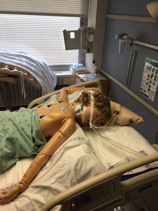For the last two years — and long before COVID-19 began its spread across the world — IUPUI’s Rebecca Ellis led a collaborative project with team members from IU Health that applies best-practice evidence for managing acute respiratory distress syndrome (ARDS) using a supportive intervention called proning.
Ellis has not been surprised to see this technique emerge as a recommended practice for COVID-19 patients.
“Proning is a supportive intervention that has been used for decades and is the best practice for treatment of ARDS, a potentially life-threatening condition that causes fluid build-up in the lungs, limiting oxygen exchange,” said Ellis, an associate professor and assistant dean for graduate programs and Doctor of Nursing Practice coordinator at the IU School of Nursing. “With proning, patients are positioned on their stomachs, and the position, combined with gravity, helps the lungs expand and improve oxygen exchange.”
ARDS-like symptoms are seen in a significant number of COVID-19 cases, affecting the lungs and causing shortness of breath, contributing to the patient’s need to be in critical care.
“Proning is helpful for people with COVID-19 respiratory symptoms, because people can have improved outcomes from proning,” Ellis said. “In some cases, proning may even help prevent patients from needing to be put on ventilators. With ventilators in short supply in some areas, using innovative and evidence-based strategies can be effective way to deliver high-quality care.”



